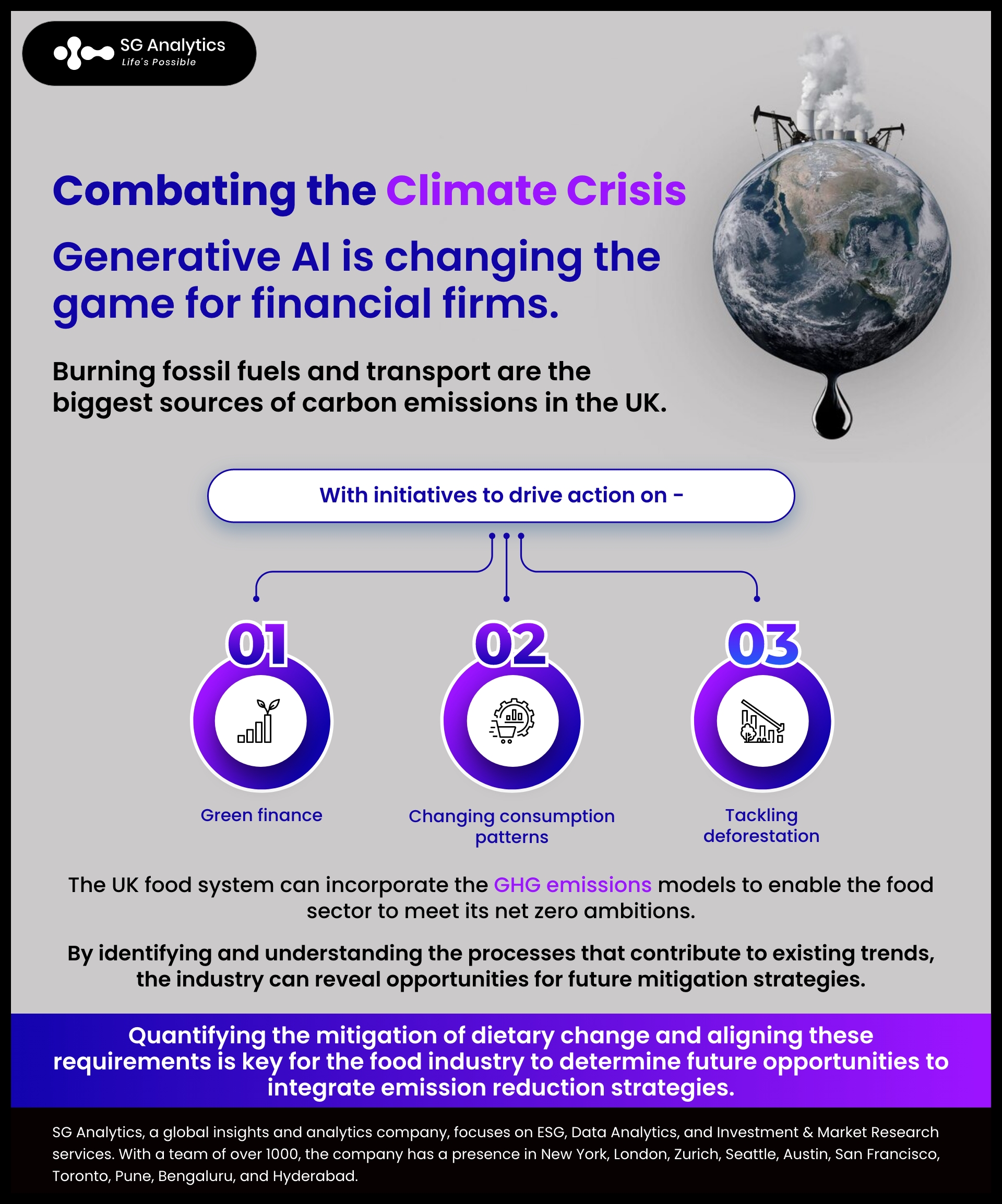Research has highlighted that the food system is likely to drive the world beyond 1.5C of global warming without urgent action. Due to this reason, there is a growing need to transform the food systems and prevent this scenario.
The UK food system GHG model has been tracking food-related emissions and estimated a reduction of 12% in the overall GHG emissions between 2015 and 2020, largely due to the decarbonisation of the grid. However, the average annual rate of reduction in GHGs will have to increase by almost 60% by 2030 for the sector to meet its GHG target. Through the WRAP (The Waste and Resources Action Programme) Courtauld Commitment 2030, 76 food businesses in the UK have committed to cut down on greenhouse gas (GHG) emissions from the food industry by almost 50% by the year 2030.
Read more: Unlocking the Value of ESG Data: How Analytics Drives Responsible Investing
The UK Food Industry
In the 2021 report on the UK food system GHGs, the Government proposed a pathway of GHG reductions to meet the Courtauld 2030 target. Responsible measurement of GHGs from food and subsequent analysis is critical for the sector to take some of the difficult decisions required. It is equally important to measure the contribution of the environment to the economy, along with the impact of economic activity and society's response to environmental problems.
Along with the increase in food supply emissions, changing food consumption patterns are also having implications for human health.

To hit their carbon budgets, governments are developing policy evidence and advocating policy solutions to decarbonise the use of energy. They are also commissioning research from independent experts to ensure that the imposed policies are promoted effectively. With initiatives to drive action on green finance, changing consumption patterns, and tackling deforestation, the UK food system is incorporating the GHG emissions models to enable the food industry to meet its net zero ambitions. However, some of the challenges include power imbalances in the food supply chains, lack of consumer demand, and political will. There is now a growing need to revise the business models reliant on ever-increasing levels of consumption and reward the best practices to reduce the emissions associated.
Read more: Green Bonds Explained: Are They Effective for Your Business?
Greenhouse Gas Emissions of UK Food Supply Chain
The food systems contribute to 23–42% of global greenhouse gas emissions. Reducing the food system emissions has now become an essential component of climate change mitigation. By incorporating a system-wide approach such as production, processing, and demand-side transformations, there is a need to track long-term greenhouse gas (GHG) emissions from the food supply to initiate this transformation. With precise identification of relative contributions of supply-side and demand-side changes to historical trends and the gap between current UK food consumption and EAT-Lancet recommended diets, the industry can estimate the additional GHG emission reductions that need to be achieved.
By identifying and understanding the processes that contribute to existing trends, the industry can reveal opportunities for future mitigation strategies. Both supply- and demand-side changes can contribute to reductions in GHG emissions from food and contribute to mitigating the GHG emissions. To mitigate the food system emissions, supply-side measures should aim to reduce the emission intensity of food production through practices like reducing fertilizer runoff and improving energy-use efficiency. At the same time, the demand-side measures should aim to reduce emissions via waste reduction and dietary change.
Understanding the contributions of supply- and demand-side changes to long-term trends in food supply emissions will enable businesses to gain crucial insights and devise emissions reduction scenarios, critical for identifying further emissions mitigation. Without transformational changes to global food systems, the emissions from food are likely to increase due to the rising consumption of emission-intensive foods and the rise in the global population. Identifying measures that provide emissions reductions as well as net neutral or beneficial health outcomes is vital.

Read more: The Growing Demand for ESG Data: Trends and Market Outlook
Power
Burning of fossil fuels is one of the critical sources of carbon emissions in the UK, making it vital to phase out fossil fuels as quickly as possible by embarking on a 100% renewable future by 2050. They are also working to ensure a transition to a sustainable system that will be focused on clean, renewable energy sources backed by electricity storage and demand flexibility. To build upon the progress that has already been made, the Government is making a commitment to end the use of coal in the UK energy system and advocating more support for increased deployment of renewable energy.
Transport
Transport is another significant source of emissions in the UK, indicating that progress towards low-emissions transport is crucial to hit UK carbon budgets and make meaningful progress on the path of reducing carbon emissions. The UK government is working to make progress on a number of different policies with regard to transport. The Government is bringing forward its 2040 target to end the sale of petrol as well as diesel automobiles by the year 2030 to take meaningful air pollution and emissions reduction actions. They are also funding the charging infrastructure needed for electric vehicles (EVs) and offering incentives to ditch petrol and diesel cars.
Read more: How ESG Scores Impact Investment Decisions?

Conclusion
The UK food sector does not exist in a vacuum. The current policy initiatives from the UK government related to the food sector lack the scope and ambition to meet the national GHG targets. Also, despite widespread consensus to achieve net zero, there is an investment gap of almost £20bn in the UK, preventing the necessary reductions in net GHG emissions.
The UK can influence global climate progress via domestic action on emissions reduction and adaptation. The Government has also set out a vision for its international climate and nature ambition in its 2030 Strategic Framework. The strategy aims at deploying joined-up efforts using domestic levers to contribute to global climate and nature goals meaningfully. The Strategic Framework represents a clear intention to maintain the UK’s legacy in this space with detailed future actions. The UK Government also intends to track the policy progress and acknowledge the domestic and international policy decisions to contribute to realising the 2030 vision.
Quantifying the mitigation of dietary change and aligning these requirements is key for the food industry to determine future opportunities to integrate emission reduction strategies.
SG Analytics, recognized by the Financial Times as one of APAC's fastest-growing firms, is a prominent insights and analytics company specializing in data-centric research and contextual analytics. Operating globally across the US, UK, Poland, Switzerland, and India, we expertly guide data from inception to transform it into invaluable insights using our knowledge-driven ecosystem, results-focused solutions, and advanced technology platform. Our distinguished clientele, including Fortune 500 giants, attests to our mastery of harnessing data with purpose, merging content and context to overcome business challenges. With our Brand Promise of "Life's Possible," we consistently deliver enduring value, ensuring the utmost client delight.
A leader in ESG Services, SG Analytics offers bespoke sustainability consulting services and research support for informed decision-making. Contact us today if you are in search of an efficient ESG (Environmental, Social, and Governance) integration and management solution provider to boost your sustainable performance.









